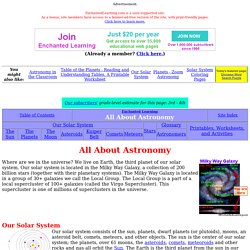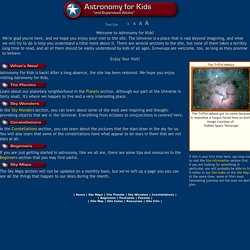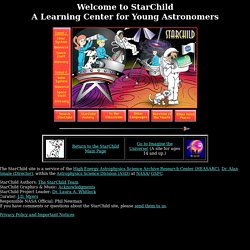

Windows to the Universe. Enchanted Learning -Astronomy. Where are we in the universe?

We live on Earth, the third planet of our solar system. Our solar system is located in the Milky Way Galaxy, a collection of 200 billion stars (together with their planetary systems). The Milky Way Galaxy is located in a group of 30+ galaxies we call the Local Group. The Local Group is a part of a local supercluster of 100+ galaxies (called the Virgo Supercluster). This supercluster is one of millions of superclusters in the universe. Our Solar System Our solar system consists of the sun, planets, dwarf planets (or plutoids), moons, an asteroid belt, comets, meteors, and other objects. The Planets The nine planets that orbit the sun are (in order from the Sun): Mercury, Venus, Earth, Mars, Jupiter (the biggest planet in our Solar System), Saturn (with large, orbiting rings), Uranus, Neptune, and Pluto (a dwarf planet or plutoid).
The inner planets are: Mercury, Venus, Earth, and Mars. Frontiernet's Astronomy For Kids. Online Star Register - Astronomy Basics & Links. Astronomers study our universe and the objects found within it such as stars, planets, and galaxies like the one we live in, the Milky Way.

Almost one quarter of all astronomers are women and almost all professional astronomers work in the field of government or education. Despite popular belief, astronomers spend more time in the classroom and on the computer than staring through a big telescope pondering the stars. Amateur astronomers, also called “backyard” astronomers, spend more time stargazing. It’s important to remember that without the constant watch from amateur astronomers, many stars and comets would not have been found. Amateur astronomers are very important to the field of astronomy. Astronomy comes from the Greek word “astronomia” which comes from two other Greek words: “astron,” or stars, and “nomos,” meaning law.
What Do Astronomers Do? First, take a brief look at what astronomers do. How Did the Universe Begin? There has always been debate about how the universe began. The Science Spot - Astronomy Links. Science Kids - Astronomy for Kids. Dudtbunny's Astronomy for Kids! The Triffid Nebula The Triffid Nebula got its name because it resembles a fungus found here on EarthImage Courtesy of:Hubble Space Telescope If this is your first time here, you may want to visit the Site Information section first.

If you are looking for something in particular, you will probably be able to find it either in our Site Index or the Site Map. At the same time, some of life's most fascinating journeys are the ones we don't plan. Astronomy For Kids is back! Learn about our planetary neighborhood in the Planets section. In the Sky Wonders section, you can learn about some of the most awe-inspiring and thought-provoking objects that are in the Universe. In the Constellations section, you can learn about the pictures that the stars draw in the sky for us. If you are just getting started in astronomy, like we all are, there are some tips and resources in the Beginners section that you may find useful. Planets For Kids. StarChild: A Learning Center for Young Astronomers. The StarChild site is a service of the High Energy Astrophysics Science Archive Research Center (HEASARC), Dr.

Alan Smale (Director), within the Astrophysics Science Division (ASD) at NASA/GSFC. StarChild Authors: The StarChild Team StarChild Graphics & Music: Acknowledgments StarChild Project Leader: Dr. Laura A. Whitlock Curator: Responsible NASA Official: If you have comments or questions about the StarChild site, please send them to us. Rader's COSMOS4KIDS. ASTRONOMY for Kids. KidsAstronomy.com. The Sky - Discover Space Exploration.